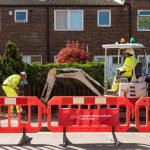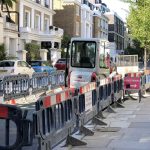Mobile UK Publish Familiar Plan to Boost 4G and 5G Coverage

Industry trade body Mobile UK, which represents Three UK, EE (BT), O2 (Virgin Media) and Vodafone, has joined with the Mobile Infrastructure Forum (MIF) to set out a series of recommendations for how the next government can tackle an “underfunded and under resourced planning system” to “unlock growth and get Britain fully connected” to the latest 4G, 5G and future 6G networks.
Ofcom recently reported that, as of January 2024 (here), geographic coverage of 4G mobile (mobile broadband) networks stood at between 81-88% for all operators, while 85-92% of UK premises can get outdoor 5G coverage via at least one operator (population coverage). But the latter figure drops to just 16-28% when considering outdoor 5G capable premises covered by all operators.
However, there are a number of programs and targets that are attempting to support improvements in this area, such as the £1bn industry-led Shared Rural Network project (i.e. extending geographic 4G coverage to 95% of the UK by the end of 2025) and the Wireless Infrastructure Strategy (i.e. “all populated areas to be covered by ‘standalone’ 5G (5G-plus) by 2030”). But problems remain on the deliverability side, particularly when it comes to 5G.
Advertisement
The new and somewhat high-level report – ‘Failing to Plan, Planning will fail‘ – from Mobile UK and the MIF has thus sought to find ways of accelerating these deployments, which they’ve done by attempting to “uncover the barriers that exist within the planning system that hinder the roll-out of this critical national infrastructure.”
Hamish MacLeod, CEO of Mobile UK, said:
“There is widespread acknowledgement that the planning system is dysfunctional, and we are calling on all parties to acknowledge this and commit to our six-point planning framework.
We see this dysfunction on a daily basis. Planning departments operate on tight budgets and face severe labour and skills shortages, which has led to inconsistency and delays in decision-making.”
In particular, the report notes that replacing existing infrastructure can still be challenging, while planning decisions for mobile infrastructure in remote areas can take up to 2 years (appeals against negative decision can also be slow). Furthermore, there remains a lack of awareness and understanding about the benefits of mobile connectivity, which often results in objections to new masts etc.
The report then goes on to make a series of six recommendations, which will no doubt already be quite familiar to our regular readers because they’ve often come up before in prior reports from the industry (here, here and here).
The Six Recommendations
1. Urgently increase funding for planning services – there are a range of policies in place to combat this, but they need to be delivered, and additional financial support is needed.
2. Recognise the importance of mobile infrastructure in the planning system – to ensure that sufficient weighting is given to the economic and social benefits of mobile connectivity by building super squads of mobile infrastructure specialists, creating barrier-busting taskforces, fast-tracking of planning in key growth areas and exploring mobile connectivity considerations in redevelopments.
3. Hire Digital Champions to support the planning process – helping to align decision-making within local authorities around digital connectivity, and acting as a single point of contact for the mobile infrastructure industry.
4. Do more to attract and retain talent – local authorities, government departments and professional bodies should build upon programmes like Pathways to Planning; and implement steps to reverse recent pay erosion for planning professionals to help retain talent.
5. Improve planning policy frameworks – telecommunications-specific reviews of the National Planning Policy Framework and Permitted Development Rights should happen as soon as possible.
7. Foster proactive digital leadership within councils – by working with local government bodies to ensure the benefits of mobile connectivity are well understood by councils and that an evidence-based and honest discussion can be made with residents about the infrastructure required to provide it.
In terms of fostering softer planning rules, we’ve already seen some developments on this front, such as changes to support the use of taller masts and making it easier to upgrade existing sites via Permitted Development (PD) rights. But one big obstacle to further change is that politicians still have to balance such demands against issues of public opinion (i.e. new mobile masts often attract complaints), which is particularly relevant during a General Election period.
Advertisement
On the flip side, there are also plenty of people and politicians who object to new masts based on questionable grounds, which can create unnecessary obstructions to deployments that would otherwise be very suitable. Finding a balance in this area remains feverishly difficult, but it’s a problem that the next government will have to tackle if they want to improve the pace and performance of UK mobile infrastructure.
At the same time, nobody should be pretending that mobile network operators and related infrastructure developers are saintly figures that will only ever do the right thing, which means that some credible checks and balances against abuse of even a more flexible approach must always exist.
Mark is a professional technology writer, IT consultant and computer engineer from Dorset (England), he also founded ISPreview in 1999 and enjoys analysing the latest telecoms and broadband developments. Find me on X (Twitter), Mastodon, Facebook, BlueSky, Threads.net and Linkedin.
« Lyca Mobile UK Auditor PKF Littlejohn Refuses to Sign Off Accounts






















































Really… sort out coverage and then 5G speeds.
Time is money, and all this time wasted going through the UK’s awful planning system slows these things down, and makes them more expensive.
The issue is repeated with energy too – wind & solar farms, power lines, all delayed or blocked for years tied up in planning as locals get to completely invent concerns
Its called democracy, put up with it, you may need it yourself one day.
Brighton needs some serious 5G investment. The size of the UK, the cost of our mobile contracts / plans and the overall signal don’t add up. We should be an amazing country with excellent 4G and 5G coverage everywhere, but something has gone amiss.
4G and 5G really needs improving.
I have noticed much worse coverage since 3G switch off on Vodafone. Often only 2G.
EE are not as badly affected.
Shouldn’t the Planning Inspectorate be responsible for collecting the reasons to support or object so that standard responses can be provided without delay and with consistency?